Related Research Articles
The gay panic defense or homosexual advance defence is a strategy of legal defense, which refers to a situation in which a heterosexual individual charged with a violent crime against a homosexual individual claims they lost control and reacted violently because of an unwanted sexual advance that was made upon them. A defendant will use available legal defenses against assault and murder, with the aim of seeking an acquittal, a mitigated sentence, or a conviction of a lesser offense. A defendant may allege to have found the same-sex sexual advances so offensive or frightening that they were provoked into reacting, were acting in self-defense, were of diminished capacity, or were temporarily insane, and that this circumstance is exculpatory or mitigating.
The Sylvia Rivera Law Project (SRLP) is a legal aid organization based in New York City at the Miss Major-Jay Toole Building for Social Justice that serves low-income or people of color who are transgender, intersex and/or gender non-conforming. The organization was formed in August 2002 by attorney and transgender civil rights activist, Dean Spade. The project was named for Sylvia Rivera, a transgender activist and veteran of the 1969 Stonewall Riots, who died the same year that SRLP was formed.

Marsha P. Johnson was an American gay liberation activist and self-identified drag queen. Known as an outspoken advocate for gay rights, Johnson was one of the prominent figures in the Stonewall uprising of 1969.
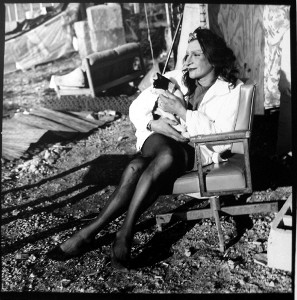
Sylvia Rivera was an American gay liberation and transgender rights activist who was also a noted community worker in New York. Rivera, who identified as a drag queen for most of her life and later as a transgender person, participated in demonstrations with the Gay Liberation Front.
Street Transvestite Action Revolutionaries (STAR) was a gay, gender non-conforming and transvestite street activist organization founded in 1970 by Sylvia Rivera and Marsha P. Johnson, subculturally-famous New York City drag queens of color. STAR was a radical political collective that also provided housing and support to homeless LGBT youth and sex workers in Lower Manhattan. Rivera and Johnson were the "mothers" of the household, and funded the organization largely through sex work. STAR is considered by many to be a groundbreaking organization in the queer liberation movement and a model for other organizations.
LGBT movements in the United States comprise an interwoven history of lesbian, gay, bisexual, transgender and allied movements in the United States of America, beginning in the early 20th century and influential in achieving social progress for lesbian, gay, bisexual, transgender and transsexual individuals.

The transgender rights movement is a movement to promote the legal status of transgender people and to eliminate discrimination and violence against transgender people regarding housing, employment, public accommodations, education, and health care. A major goal of transgender activism is to allow changes to identification documents to conform with a person's current gender identity without the need for gender-affirming surgery or any medical requirements, which is known as gender self-identification. It is part of the broader LGBT rights movements.
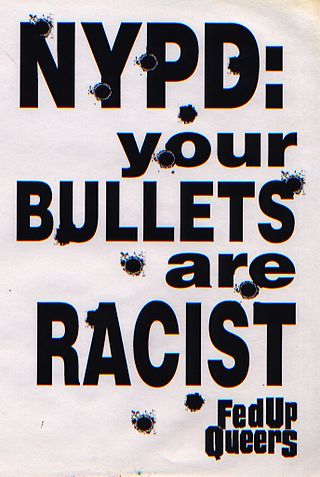
Fed Up Queers, or FUQ, was a queer activist direct action group that began in New York City. The group was made up mostly of lesbians such as Jennifer Flynn, though notable participants also included gay rights pioneer and Stonewall riots veteran Bob Kohler, and writer Mattilda Bernstein Sycamore. The activists who formed FUQ came together loosely for a few actions in 1998, but the first action attributed to Fed Up Queers was on World AIDS Day, December 1, 1998, when they visited New York State Assemblywoman Nettie Mayersohn's house in Queens at midnight to protest her stance on names reporting.
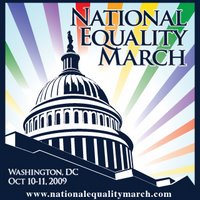
The National Equality March was a national political rally that occurred October 11, 2009 in Washington, D.C. It called for equal protection for lesbian, gay, bisexual, and transgender (LGBT) people in all matters governed by civil law in all 50 states and the District of Columbia. The march was called for by activist David Mixner and implemented by Cleve Jones, and organized by Equality Across America and the Courage Campaign. Kip Williams and Robin McGehee served as co-directors. Leaders like actress Michelle Clunie, Courage Campaign marketing director, Billy Pollina and New York gubernatorial aide Peter Yacobellis hosted the first fundraiser in the spring of 2009. This was the first national march in Washington, D.C. for LGBT rights since the 2000 Millennium March.

The history of violence against LGBT people in the United States is made up of assaults on gay men, lesbians, bisexuals, and transgender individuals (LGBT), legal responses to such violence, and hate crime statistics in the United States of America. The people who are the targets of such violence are believed to violate heteronormative rules and they are also believed to contravene perceived protocols of gender and sexual roles. People who are perceived to be LGBT may also be targeted for violence. Violence can also occur between couples who are of the same sex, with statistics showing that violence among female same-sex couples is more common than it is among couples of the opposite sex, but male same-sex violence is less common.
Tiq Milan is an American writer, public speaker, activist, and strategic media consultant. He is currently a national spokesperson for GLAAD and the former senior media strategist of national news at GLAAD. Prior to his current roles, he was a mentor and teacher at the Hetrick-Martin Institute, an LGBTQ youth nonprofit organization in NYC. His advocacy, LGBTQ activism, and journalism has been recognized nationally.
Lesbian Feminist Liberation was a lesbian rights advocacy organization in New York City formed in 1972.

Lee Greer Brewster was an American drag queen, transgender activist, and retailer. He was a founding member of the pre-Stonewall activist group, Queens Liberation Front. In the 1970s and 1980s, he published Drag magazine. Brewster helped to raise funds for the very first U.S. celebration of Pride, Christopher Street Liberation Day in 1970. He continued to help raise funds and organize Christopher Street Liberation Day for several years. Lee Brewster was active in the homophile and gay liberation movements, working with the Mattachine Society of New York as well as the Street Transvestite Action Revolutionaries.
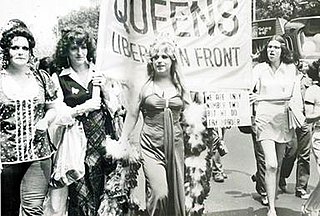
Queens Liberation Front (QLF) was a homophile group primarily focused on transvestite rights advocacy organization in New York City. QLF was formed in 1969 and active in the 1970s. They published Drag Queens: A Magazine About the Transvestite beginning in 1971. The Queens Liberation Front collaborated with a number of other LGBTQ+ activist groups, including the Gay Activists Alliance and the Street Transvestite Action Revolutionaries.
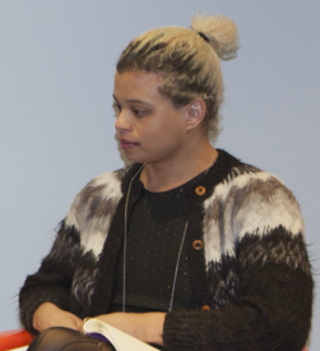
Tourmaline is an American artist, filmmaker, activist, editor, and writer. She is a transgender woman who identifies as queer. Tourmaline is most notable for her work in transgender activism and economic justice, through her work with the Sylvia Rivera Law Project, Critical Resistance and Queers for Economic Justice.
The National LGBTQ Wall of Honor is an American memorial wall in Greenwich Village, Lower Manhattan, New York City, dedicated to LGBTQ "pioneers, trailblazers, and heroes". Located inside the Stonewall Inn, the wall is part of the Stonewall National Monument, the first U.S. National Monument dedicated to LGBTQ rights and history. The first fifty nominees were announced in June 2019, with the wall unveiled on June 27, 2019, as a part of Stonewall 50 – WorldPride NYC 2019 events. Five honorees will be added annually.
Rusty Mae Moore was an American transgender rights activist and educator. She ran a de facto homeless shelter for transgender people in the 1990s and 2000s, known as the Transy House. One such resident included Sylvia Rivera, one of the most prominent voices in trans and queer activism, who lived at Transy House until her death in 2002.
References
- 1 2 3 Siegal, Nina (2000-07-24). "Watershed of Mourning At the Border of Gender". New York Regional. The New York Times on the Web. Retrieved 2024-02-28.
- 1 2 3 4 Siegal, Nina (2001-06-20). "The crying game". Salon.com . Archived from the original on 2023-02-27. Retrieved 2024-02-28.
- 1 2 3 "District Attorney - New York County" (Press release). New York County District Attorney's Office. 2000-12-22. Archived from the original on 2010-06-16. Retrieved 2008-11-05.
- 1 2 3 Sycamore, Matt Bernstein (2004). That's Revolting!: Queer Strategies for Resisting Assimilation. Soft Skull Press. pp. 101–2. ISBN 9781932360561 . Retrieved 2008-11-16.
- 1 2 3 4 5 Shepard, Benjamin Heim (2002). "Amanda Milan and The Rebirth of Street Trans Activist Revolutionaries". From ACT UP to the WTO: Urban Protest and Community Building in the Era of Globalization. Verso. pp. 156–163. ISBN 1-85984-356-5.
- ↑ Currah, Paisley; Richard M. Juang; Shannon Minter (2006). Transgender Rights. U of Minnesota Press. p. 3. ISBN 9780816643127 . Retrieved 2008-11-16.
- ↑ Gregorian, Dareh (2002-11-09). "BX. MAN GUILTY IN SLAYING OF TRANSSEXUAL". New York Post. p. 014.